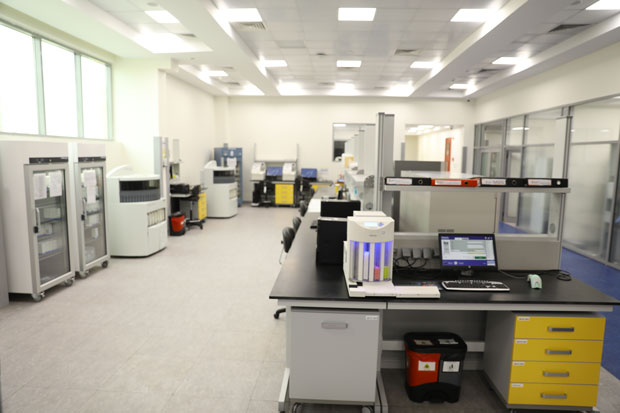Synovial sarcoma fusion panel

Synovial Sarcoma panel
- Clinical Implications
- Diagnosis of Synovial sarcoma
- Characteristic t(X;18)(p11;q11) in vast majority of tumors
- One of SSX genes at Xp11 fuses to SS18 gene (formerly termed SYT) at 18q11
- May involve SSX1 (most common), SSX2, or SSX4
- SSX1 most common in biphasic SS
- Distinctive translocation has not been recognized in other similar tumors
- Test Description
- Test approach
- Reporting name
- Test prerequisites (To ensure timely results)
- Patient’s demographic data.
- Clinicopathologic information:
- Pathology report (final or preliminary) including anatomic location.
- History of any given therapy for cancer and its date and relation to sample sent for molecular study (i.e. pre & post therapy). Therapy includes chemo and radiotherapy, hormonal or targeted therapy.
- Any other relevant clinical data or history.
- Type of sample:
- Preferred: Formalin-fixed, paraffin-embedded (FFPE) tumor tissue block.
- Acceptable:
- Section in Eppendorf: Up to 4 sections, each with a thickness of up to 10 μm and a surface area of up to 250 mm2 + good H&E slide for assessment.
- Five unstained slides + one good H&E slide.
- Specimen Minimum Volume: Two 10-micron sections of FFPE.
- Quality Control measures
- From your side:
- Double check you are fulfilling all required data before sending your sample.
- Check that your pathologist has selected the best block in terms of tumor cellularity, with least presence of necrosis and inflammation.
- Pretherapy sample is preferred (if underwent any cancer therapy).
- In our lab:
- Assessment of tissue for adequacy & tumor cellularity before any molecular analysis.
- Matching block ID with the report ID and demographic data.
- Matching the submitted block with the data reported in the pathology report.
- N.B.
- If the sample sent in Eppendorf, it is your pathology lab’s responsibility to ensure the sample in Eppendorf is corresponding to the submitted H&E slide (we can’t prepare slide from Eppendorf).
- This test does not include a pathology consultation.
- Test Time
- Retention of the sample
- Selected References
- Tamaki S et al: SS18-SSX, the Oncogenic Fusion Protein in Synovial Sarcoma, Is a Cellular Context-Dependent Epigenetic Modifier. PLoS One. 10(11):e0142991, 2015
- Coindre JM et al: Should molecular testing be required for diagnosing synovial sarcoma? a prospective study of 204 cases. Cancer. 98(12):2700-7, 2003
- Ladanyi M et al: Impact of SYT-SSX fusion type on the clinical behavior of synovial sarcoma: a multi-institutional retrospective study of 243 patients. Cancer Res. 62(1):135-40, 2002
- Pelmus M et al: Monophasic fibrous and poorly differentiated synovial sarcoma: immunohistochemical reassessment of 60 t(X;18)(SYT-SSX)-positive cases. Am J Surg Pathol. 26(11):1434-40, 2002
Synovial sarcoma: Malignant mesenchymal spindle cell neoplasm with variable epithelial differentiation, including gland formation, and characterized by specific chromosomal translocation t(X;18)(p11;q11).
Real-time PCR for quantitative detection of SS18-SSX1 & SS18-SSX2 rearrangement.
RNA was isolated and converted into cDNA. TaqMan Gene Expression Assays were used for quantitative polymerase chain reaction (qPCR) analysis of SS18-SSX1/2 fusion transcripts. Results interpreted according to the manufacture user guide.
Synovial Sarcoma Fusion gene Panel
All samples are subject to stringent quality control measures that include:
From 3 days to 5 working days.
Client provided paraffin blocks & unstained slides (if provided) will be returned after testing is complete.